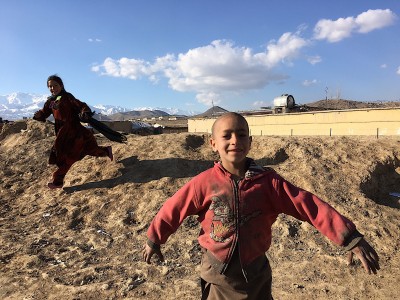Afghanistan Facing ‘Total Collapse’ as Biden Refuses to Release Central Bank Assets
"If the Afghan economy is not resuscitated, the severity of the current humanitarian crisis will only deepen, with dire consequences for life and limb of ordinary Afghans," warned one aid group.

All Global Research articles can be read in 51 languages by activating the “Translate Website” drop down menu on the top banner of our home page (Desktop version).
To receive Global Research’s Daily Newsletter (selected articles), click here.
Visit and follow us on Instagram, Twitter and Facebook. Feel free to repost and share widely Global Research articles.
***
An international aid group warned Wednesday that Afghanistan is on the brink of complete collapse as the Biden administration and European governments refuse to release the war-torn nation’s central bank reserves, depriving the economy of critical funds as millions face poverty and starvation.
In a statement ahead of an international donor conference for Afghanistan, the International Rescue Committee (IRC) said the country “is now the world’s largest-ever humanitarian appeal, requiring a staggering US$4.47 billion in humanitarian aid—quadruple the needs at the start of 2021 and more than is required for either Syria or Yemen.”
Since the Taliban retook power last August following two decades of U.S.-led warfare, IRC noted, “the speed of Afghanistan’s economic collapse has been unprecedented.” Following the withdrawal of American troops, the Biden administration froze billions of dollars in Afghan central bank assets held in the U.S. despite warnings that the move would push the country closer to full-scale economic ruin.
Last month, U.S. President Joe Biden issued an executive order aiming to permanently seize Afghanistan’s assets and split them between the families of 9/11 victims and an ill-defined “trust fund” for Afghans. Blocked from accessing its own reserves, Kabul has struggled to afford even the import taxes on containers of badly needed food.
Moreover, the Biden administration has left in place crippling economic sanctions that could kill more civilians than 20 years of war, according to one analyst.
European governments and international institutions also took punitive steps following the Taliban’s return to power, suspending financing for projects in Afghanistan and leaving humanitarian groups on the ground without the resources needed to help the growing number of sick and malnourished Afghans.
“Afghans that could support themselves and their families six months ago are now entirely dependent on aid,” IRC said Wednesday. “With each week that goes by, more Afghans are forced to resort to the unimaginable to survive: since August, the number of Afghans resorting to negative coping capacities has risen sixfold, such as selling young daughters into marriage, pulling children out of school to work, selling organs, skipping meals, or taking on high levels of debt.”
The New York Times reported Tuesday that Afghans desperate for cash to feed their families are turning to “backbreaking work” in the notoriously dangerous mines of northern Afghanistan. Some toiling in the mines are as young as 10 years old, according to the newspaper.
UNICEF recently warned that more than a million Afghan children will need treatment for severe acute malnutrition this year and 13 million kids in total will need humanitarian assistance.
David Miliband, IRC’s president and CEO, said Wednesday that the actions of the international community have pushed Afghanistan toward “total collapse.”
“If the Afghan economy is not resuscitated, the severity of the current humanitarian crisis will only deepen, with dire consequences for life and limb of ordinary Afghans,” said Miliband. “Further economic distress will only mean greater displacement, greater insecurity, and greater misery.”
Miliband urged countries and humanitarian groups participating in Thursday’s donor conference to ramp up aid to Afghanistan, but stressed that such charity work “only addresses the symptoms rather than the drivers of a failing economy.”
“Afghanistan urgently requires a roadmap for international engagement to address the economic crisis, including benchmarks for the release of frozen Afghan assets to the central bank,” Miliband argued. “In the immediate term, this will require donors and financial institutions to help rebuild the capacity of the central bank to operate independently, adhere to international banking standards, and manage the Afghan economy.”
“The urgent work to stave off famine and preventable deaths in the coming weeks and months should not crowd out the important work to halt the trajectory of this crisis and stabilize the economy,” he continued. “Until these measures are taken, Afghan civilians will continue to pay for the transgressions of others with their own lives and suffering.”
Welthungerhilfe, a Germany-based humanitarian nonprofit, voiced similar fears on Tuesday, pointing out that 95% of the Afghan population “no longer has adequate nutrition”—a crisis exacerbated by Russia’s war on Ukraine, which has pushed up commodity prices and intensified supply chain disruptions.
“Afghanistan is in free fall,” said Thomas ten Boer, Welthungerhilfe’s director in Kabul. “The sanctions are crushing the economy and preventing money from entering the country. Agricultural production will continue to plummet because farmers cannot purchase seeds or fertilizer due to drastic price hikes.”
“We are risking the future of an entire generation that now lacks both adequate nutrition and a proper education,” he added.
From Common Dreams: Our work is licensed under Creative Commons (CC BY-NC-ND 3.0). Feel free to republish and share widely.
*
Note to readers: Please click the share buttons above or below. Follow us on Instagram, Twitter and Facebook. Feel free to repost and share widely Global Research articles.

